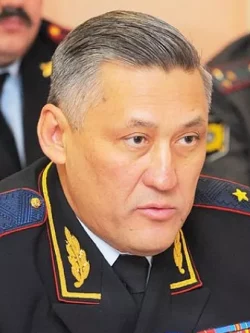Member of the Federation Council, representative of the Jewish Autonomous Region, deputy chairman of the Federation Council Committee on Defense and Security.
Born on April 18, 1959 in the village of Zhuravlikha, Krayushkinsky (now Pervomaisky) district of the Altai Territory.
In 1980 he graduated from the Omsk Higher Police School. In 2009 he became a candidate of legal sciences.
From 1980 to 1981 he held the position of criminal investigation inspector for the preventive service of the Department of Internal Affairs of the Oktyabrsky District Executive Committee of Barnaul, Altai Territory. In 1981, he took the position of senior criminal investigation inspector, and in 1985 he became deputy head of the criminal investigation department.
From 1989 to 1993 he was the head of the Municipal Department of Internal Affairs of the Oktyabrsky District Executive Committee of Barnaul.
In 1993, he became the head of the Department of Internal Affairs of the Leninsky District of Barnaul.
1997 to 1999 - Deputy Head of the Barnaul Internal Affairs Directorate. In 1999, he became the first deputy head of the Internal Affairs Directorate of the Altai Territory.
From 2002 to 2011 - Minister of Internal Affairs for the Altai Republic.
In 2011, he became the head of the Main Directorate of the Ministry of Internal Affairs of Russia for the Perm Territory.
In 2014, he was awarded the rank of lieutenant general of police, and in the same year he was appointed head of the Main Directorate for Ensuring Public Order of the Ministry of Internal Affairs of Russia.
Since September 22, 2020 - Senator of the Russian Federation - representative from the executive branch of the Jewish Autonomous Region.
While serving as Senator, he not only voted for the adoption of various laws, but also himself proposed some legislative initiatives, for example, on the right of operatives and judges to hide information about their property in Rosreestr. This rule was also extended to relatives and subordinates of security officials, thereby preventing anti-corruption investigations.
With the beginning of the military aggression of the Russian Federation against Ukraine, he initiated the introduction of Basic Military Training lessons in schools:
“After the start of the Special Military Operation, it became absolutely clear to all Russians: in order to effectively defend the Fatherland, they need to progressively gain knowledge in the field of military training.”
- Violation of the territorial integrity of Ukraine. So Valyaev in 2022, together with other Senators of the Federation Council, voted for recognition of the independence of the puppet republics of the DPR and LPR. The request of these quasi-state entities for military assistance became the reason for Putin’s invasion of Ukraine.
In the summer of 2022, he voted for the annexation of the Kherson, Zaporozhye, Donetsk and Lugansk regions of Ukraine.
For these actions, he was included in the sanctions lists of the EU, USA, UK, Canada, Australia, New Zealand, Ukraine, and Switzerland.
- Voting for the adoption of anti-democratic laws while serving as a Senator of the Federation Council, namely:
- Tightening the law on foreign agents. So in 2020, Valyaev voted for the adoption of amendments to the law on foreign agents, allowing the inclusion of individuals in the register, even those not related to the media. In 2022, Valyaev voted for further tightening of this law, which allows individuals to be added to the list of foreign agents even without foreign funding, only if there is “foreign influence.” This law imposes unnecessary, burdensome restrictions on citizens, the violation of which is subject to administrative as well as criminal liability. This law is used by the Russian authorities to persecute dissidents in situations where it is difficult to initiate a criminal case.
- Introduction to the Criminal Code and the Code of Administrative Offenses of articles on “discrediting the RF Armed Forces” and “fakes about the Russian army.” According to these articles, the authorities can prosecute citizens of the Russian Federation for anti-war statements and dissemination of information about crimes of the Russian Armed Forces.
- Tightening the article on high treason, which provides for a maximum penalty of imprisonment up to life and equates to high treason "going over to the side of the enemy", that is, persons who want to resist Putin's aggression in Ukraine.
- Russia's withdrawal from the Council of Europe, and the denunciation of related treaties, which closed the citizens of the Russian Federation from access to the European Court of Human Rights
- The introduction of criminal liability for calls for the execution of decisions of international organizations, primarily for the call to execute the decision of the International Criminal Court to arrest Putin
This activity also became one of the reasons for the introduction of sanctions in some Western countries.
Links and materials
Page on the website of the Federation Council
Full dossier on the new chief of the Main Internal Affairs Directorate of Prikamye
War and Sanctions – VALYAEV Yuri Konstantinovich
The US imposed sanctions against all Russian senators, Nabiullina and family members of officials
The European Union will subject 146 Russian senators to sanctions for the war in Ukraine

